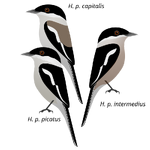| Eurypygimorphae Temporal range: Early Eocene–present | |
|---|---|
| File:White-tailed Tropicbird.png | |
| File:Sunbittern.png | |
| Top: White-tailed Tropicbird (Phaethontiformes) Bottom: Sunbittern (Eurypygiformes) | |
| Scientific classification | |
| Kingdom: | Animalia |
| Phylum: | Chordata |
| Class: | Aves |
| Clade: | Aequorlitornithes |
| Clade: | Ardeae |
| Clade: | Eurypygimorphae Fürbringer, 1888 |
| Orders | |
Eurypygimorphae is a clade of birds that contains the orders Phaethontiformes (tropicbirds) and Eurypygiformes (kagu and sunbittern) recovered by genome analysis[1] The relationship was first identified in 2013 based on their nuclear genes.[2] Historically these birds were placed at different parts of the tree, with tropicbirds in Pelecaniformes and the kagu and sunbittern in Gruiformes, though in the last decade various genetic analysis had found in the almost obsolete clade Metaves of uncertain placement within that group.[3][4] Their sister taxon is possibly Aequornithes.[1]
References[]
- ^ a b Jarvis, E.D.; et al. (2014). "Whole-genome analyses resolve early branches in the tree of life of modern birds". Science. 346 (6215): 1320–1331. PMC 4405904Freely accessible. PMID 25504713. doi:10.1126/science.1253451.
- ^ Yuri, Tamaki; Kimball, Rebecca; Harshman, John; et al. (2013). "Parsimony and Model-Based Analyses of Indels in Avian Nuclear Genes Reveal Congruent and Incongruent Phylogenetic Signals". Biology. 2 (1): 419–444. PMC 4009869Freely accessible. PMID 24832669. doi:10.3390/biology2010419.
- ^ Ericson, P. G.P; Anderson, C. L; Britton, T.; Elzanowski, A.; Johansson, U. S; Kallersjo, M.; Ohlson, J. I; Parsons, T. J; Zuccon, D.; Mayr, G. (2006). "Diversification of Neoaves: integration of molecular sequence data and fossils". Biology Letters. 2 (4): 543–547. PMC 1834003Freely accessible. PMID 17148284. doi:10.1098/rsbl.2006.0523.
- ^ Hackett, S. J.; Kimball, R. T.; Reddy, S.; et al. (2008). "A Phylogenomic Study of Birds Reveals Their Evolutionary History" (PDF). Science. 320 (5884): 1763–1768. PMID 18583609. doi:10.1126/science.1157704.

|
This article is part of Project Bird Taxonomy, a All Birds project that aims to write comprehensive articles on every order, family and other taxonomic rank related to birds. |
| This bird-related article is a stub. You can help All Birds by expanding it. |
